NURS FPX 8010 Political Landscape Analysis Paper Example
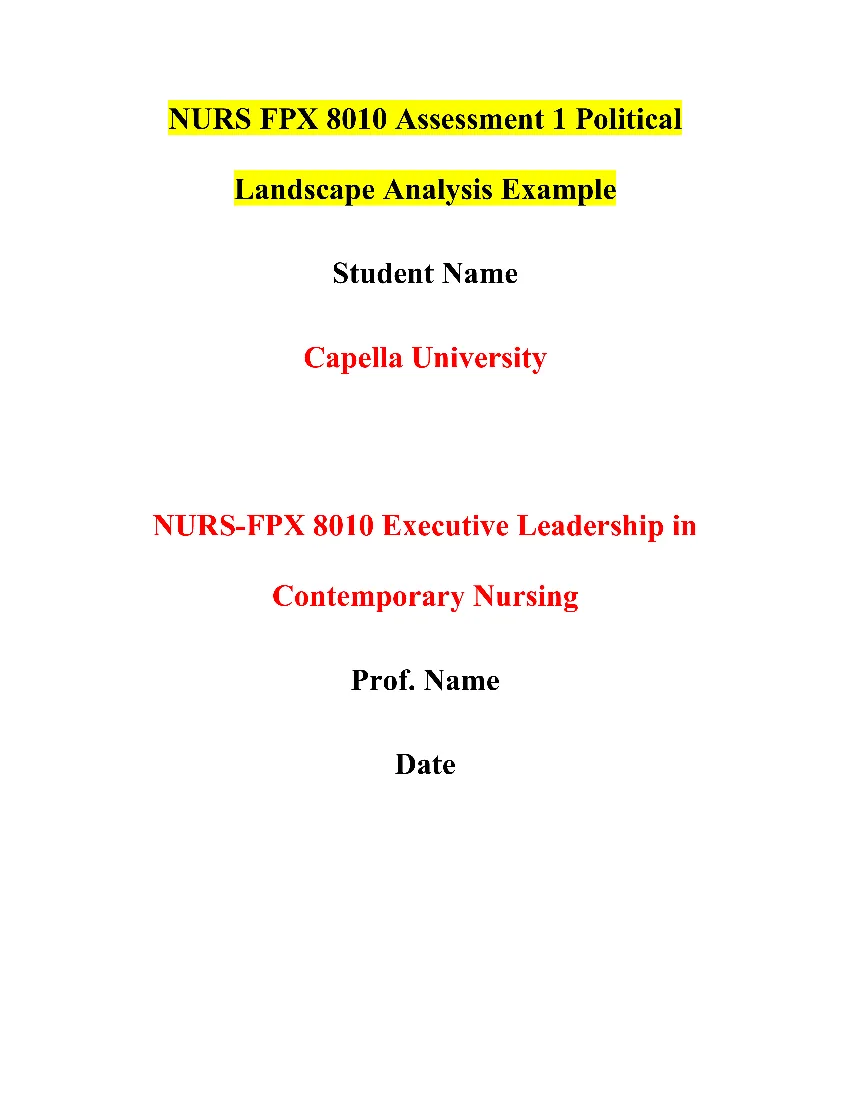 NURS FPX 8010 Assessment 1 Political Landscape Analysis
NURS FPX 8010 Assessment 1 Political Landscape Analysis
NURS FPX 8010 Political Landscape Analysis Paper Assignment Brief
Course: NURS-FPX 8010 Executive Leadership in Contemporary Nursing
Assignment Title: NURS FPX 8010 Assessment 1 Political Landscape Analysis
Assignment Instructions Overview
This assignment aims to analyze the political landscape of a healthcare organization, focusing on formal and informal power structures and their impact on organizational culture, policies, and communications.
The Student’s Role
As a student undertaking this assignment, your role is to critically evaluate the formal and informal lines of power within the given healthcare organization scenario. You will need to assess how these power dynamics influence decision-making processes, particularly at the executive level, and propose recommendations based on your analysis.
Competencies Measured
This assignment measures several competencies, including:
- Analyzing formal and informal power structures in an organization.
- Incorporating organizational power dynamics into executive-level decision-making.
- Identifying the appropriate source of power for achieving strategic objectives.
- Recommending policy changes that align with a strategic plan.
You Can Also Check Other Related Assessments for the NURS-FPX 8010 Executive Leadership in Contemporary Nursing Course:
NURS FPX 8010 Assessment 2 Strategic Plan Appraisal Example
NURS FPX 8010 Assessment 3 Strategic Plan Development Example
NURS FPX 8010 Assessment 4 Quality Improvement Proposal Example
NURS FPX 8010 Political Landscape Analysis Paper Example
Formal and Informal Lines of Power
Formal and informal lines of power are prevalent in healthcare organizations, shaping their functioning and leadership dynamics (Galliers, 2022). In hospitals, formal power is defined by positions like the President, Chief Nursing Officer (CNO), and Chief Financial Officer (CFO), outlined in the organizational hierarchy to clarify roles and responsibilities. Conversely, informal power emerges through relationships, trust, and networking within the organization, extending influence beyond formal roles. For example, the CNO holds both formal authority and informal influence, leveraging their position and connections to impact decisions and relationships.
Recognizing the formal power inherent in leadership roles is crucial, but equally important is cultivating informal power through relationship-building (Shirey, 2015). As a new CNO, it’s essential to collaborate with colleagues, respecting their input and fostering a positive work environment (Waring, et.al, 2018). Negative sentiments can undermine organizational cohesion, underscoring the need for maintaining a supportive atmosphere. Research emphasizes the significance of understanding organizational politics in navigating change processes and facilitating effective communication channels.
Comprehending power dynamics is essential for effective leadership in healthcare organizations. By embracing both formal authority and informal influence, leaders can navigate organizational politics and drive positive change within their organizations, fostering collaboration and achieving shared goals.
Organizational Power Influences on Executive-Level Decision-Making
Organizational power dynamics significantly influence executive-level decision-making processes in healthcare organizations. Understanding the rationale behind policies and decisions is crucial for leaders to fulfill their roles effectively (Galliers, 2022). In the constantly evolving healthcare landscape, it’s essential to grasp the implications of policies for successful implementation. Seeking guidance from superiors and exploring alternative solutions are essential practices for new leaders in navigating these complexities.
Adapting to change and effectively communicating with stakeholders are crucial aspects of navigating organizational power dynamics (Waring, et.al, 2018). New leaders must adjust their approach to accommodate diverse perspectives and find solutions that meet the needs of all parties involved. Building trust and fostering collaboration are essential for leveraging both formal and informal power effectively.
Maintaining awareness of the organizational climate and being proactive in identifying opportunities for improvement are vital for success (Shirey, 2015). Strategic agility, the ability to seize opportunities and adapt to new strategies, is crucial in dynamic healthcare environments. Creating a positive work environment and promoting open communication are essential for driving progress and fostering collaboration among stakeholders.
As a new leader, I actively seek guidance from superiors to comprehend the rationale behind policies and ensure their successful execution. By embracing diverse perspectives and fostering collaboration, I aim to leverage both formal and informal power to address challenges and drive positive change.
The Impact of Power on Organizational Policy
Power dynamics significantly shape organizational policies within our healthcare institution (Waring, et.al, 2018). Our Chief Medical Officer (CMO) wields considerable formal and informal authority, owing to years of experience and community influence. While the CMO’s leadership is valued, embracing diverse perspectives is vital for driving innovation and progress. As a newcomer, I aim to offer fresh insights that prioritize diversity and cultural sensitivity in policy development. Collaborative decision-making, inclusive of input from various stakeholders, is crucial for achieving policies that meet the needs of our diverse workforce and patient population. By fostering an environment of open communication and leveraging the expertise of colleagues, we can navigate power dynamics effectively to enact meaningful changes that address pressing challenges, such as the increasing patient workload.
Conclusion
In conclusion, the analysis emphasizes the significant impact of formal and informal lines of power on leadership dynamics and decision-making processes within healthcare organizations. Understanding these power dynamics is essential for effective leadership, enabling leaders to navigate organizational politics and foster positive change. By recognizing and leveraging both formal authority and informal influence, leaders can effectively address challenges, adapt to change, and promote collaboration. Embracing diverse perspectives and fostering open communication are critical for driving innovation and progress in healthcare policy development. Ultimately, navigating power dynamics effectively allows healthcare leaders to enact meaningful changes that meet the needs of their workforce and patient population, thereby contributing to the overall improvement of healthcare delivery.
References
Galliers, R.D., Simeonova, B., & Karanasios, S. (2022). Power dynamics in organizations and the role of information systems. Information Systems Journal, 32(3), 233-241.
Shirey, M.R. (2015). Strategic Agility in Healthcare Leadership. . JONA: The Journal of Nursing Administration, 45(6), 305-308..
Waring, J., Minister, P., Clarke, J., et al. (2018). Healthcare leadership with political astuteness (HeLPA): a qualitative study of how service leaders understand and mediate the informal “power and politics” of major health system change. BMC Health Services Research, 18(1), N.PAG.
Detailed Assessment Instructions for the NURS FPX 8010 Political Landscape Analysis Paper Assignment
Assessment 1 Instructions Political Landscape Analysis
NURS FPX 8010 Capella Formal & Informal Power in Healthcare Organizations Assessment
Description
Using the case scenario provided, write a 3-page analysis of the organization’s political landscape, including formal and informal power structures at play and their impact on culture, policy, and communications.
Introduction
Understanding the political landscape of an organization is key when developing strategic priorities. Knowing the key players and how to leverage relationships will help you develop a strategic plan that is meaningful to all stakeholders. Gaining stakeholder buy-in is the key to success when attempting to meet the strategic goals outlined on a balanced scorecard.
This assessment provides an opportunity for you to gain insight into organizational power structures and their effects on organizational culture, policies, and communications.
Preparation
For this assessment, use the following case scenario:
You are a new nurse executive at a community-based hospital system in the southeastern region of the United States. The system is not-for-profit and serves five rural counties. The system comprises one flagship hospital, three smaller critical access hospitals, and a number of clinics and urgent care centers. The health care system serves a diverse population of insured, Medicare, Medicaid, and uninsured patients. The hospital is Joint Commission accredited and for three years in a row has been rated as a Top 100 Hospital.
Historically, the hospital system has been physician-centric, meaning that the physician staff have had the power to influence change, policy, and protocol. The current chief executive officer (CEO) was recently hired from a large university-affiliated hospital system. The chief medical officer (CMO) started the organization’s orthopedic program (one of the most lucrative service lines) and has been with the organization for more than 25 years. He is well respected in the local community and serves on a number of community boards. In light of this strong influence from the department of medicine, nursing has struggled over the past five years. You are the second chief nursing officer (CNO) in four years. The hospital board is applying pressure to seek Magnet designation, which was recently lost due to poor leadership by your predecessor.
The hospital has recently adopted the hospitalist model to cover all in-patients. The hospitalist group was developed by physician leaders in the organization and operates as a separate department within the organization. The hospitalist group desires to become a limited liability corporation (LLC) to maximize benefit offerings but needs a larger staff to make this happen. They have presented a proposal to executive leadership to transfer all advance practice registered nurses (APRNs) working in the organization (there are more than 50) to the hospitalist group, which is housed under the department of medicine. The CMO is spearheading this initiative. Traditionally, ARPNs were hired and managed by the department of nursing.
As the new CNO, you have been approached by a group of 15 APRNs who are against the transition as it will severely impact their scope of practice, in addition to affecting their paid time off, salary, and work hours. The CMO has offered to make APRNs eligible for the annual physician hospitalist bonus structure, as an incentive. At the same time, the CMO has informally proposed that a new policy be created for APRN hospital privileges. If the APRNs choose not to join the hospitalist group, they will not be eligible for hospital privileges. In the state in which the organization is located, a supervising physician is required for APRN practice.
Instructions
Analyze the organization’s political landscape. Examine formal and informal power structures at play and how they affect organizational culture, policies, and communications at all levels.
Analysis Format and Length
Format your document using APA style.
- Use the APA Style Paper Tutorial [DOCX]to help you in writing and formatting your analysis. Be sure to include:
. A title page and references page. An abstract is not required.
. A running head on all pages.
- Use the following section headings to ensure thorough content coverage and flow.
. Formal and Informal Lines of Power.
. Organizational Power Influences on Executive-Level Decision-Making.
. The Impact of Power on Organizational Policy.
. Sources of Power.
- Provide a short conclusion to your analysis in the form of a summary or editorial.
- Your analysis should be 3 pages in length, excluding the title and references pages.
Evaluation
The following tasks correspond to the grading criteria in the assessment scoring guide, so be sure to address each point. Read the performance-level descriptions for each criterion to see how your work will be assessed.
- Analyze the formal and informal lines of power within the organization in the case study.
- Describe the informal and formal lines of power within this organization.
- What source of power is being used by the different stakeholders? For example: authority, rewards, coercion, expertise, reputation, personal power.
- Describe the effects of power structures on organizational culture, policies, and communications at all levels.
- Incorporate organizational power dynamics as a factor in executive-level decision making.
- Based on your analysis of internal power structures and your perspective as CNO, what would be the best way to respond to the concerns of the ARPNs in this scenario, and why?
- What support for your response can be found in the evidence-based literature?
- What underlying assumptions might influence your decision making?
- Assess the potential impact or influence of power on this change in organizational policy.
- What is the basis for your conclusions?
- Identify the appropriate source of power for achieving the CNO’s primary strategic objective.
- For example: authority, rewards, coercion, expertise, reputation, personal power.
- What evidence do you have to support your conclusion?
- Articulate meaning relevant to the main topic, scope, and purpose of the prompt.
- Write with a specific purpose and audience in mind.
- Adhere to scholarly and disciplinary writing standards.
- Proofread your writing to minimize errors that could distract readers and make it more difficult for them to focus on the substance of your analysis.
- Apply APA formatting to in-text citations and references.
DEMONSTRATION OF PROFICIENCY
By successfully completing this assessment, you will demonstrate your proficiency in the following course competencies and assessment criteria:
- Competency 2: Analyze formal and informal power structures in an organization.
- Analyze the formal and informal lines of power within an organization.
- Incorporate organizational power dynamics as a factor in executive-level decision-making.
- Identify the appropriate source of power for achieving a primary strategic objective.
- Competency 4: Recommend policy changes that support a strategic plan.
- Assess the potential impact or influence of power on organizational policy.
- Competency 5: Address assessment purpose in effective written or multimedia presentations, incorporating appropriate evidence and communicating in a form and style consistent with applicable professional and academic standards.
- Articulate meaning relevant to the main topic, scope, and purpose of the prompt.
- Apply APA formatting to in-text citations and references.
Give Your Grades a Boost with Our Expert Nursing Paper Writing Services!
Are you feeling overwhelmed with writing your nursing research papers or assignments? Tackling nursing assignments often involves thorough research and the gathering of relevant information and evidence. If you find yourself struggling or lacking the necessary research skills, fret not! At NursingCustomWriting.com, we’re your reliable nursing writing service, here to ease your academic journey.
Why Choose Our Nursing Paper Writing Services?
- Affordable Prices: Our online nursing papers are priced affordably, making them accessible to all college students. We understand the financial constraints students face and strive to provide quality assistance at a reasonable cost.
- Expert Writers: Let our skilled writers perfect your paper, bringing in the expertise needed for exceptional results. Our team is composed of professionals who understand the intricacies of nursing assignments, ensuring your work stands out.
- Originality Guaranteed: Bid farewell to plagiarized papers. Our nursing experts are committed to crafting original and customized nursing essays, ensuring academic integrity and success.
- Timely Support for Your Coursework: Worried about looming deadlines? We’ve mastered the art of helping nursing students with coursework, even with tight timelines. Trust us to save your academic life and ensure timely submissions.
- Easy Ordering Process: Ready to place your order? It’s hassle-free! Visit our “Place Order” page, provide paper details, proceed to checkout, and your order will be assigned to a suitable expert. We make the process seamless for your convenience.
How We Can Help You To Do Your Nursing Papers:
Our pro nursing writers create outstanding nursing essay papers from scratch, addressing any topic, meeting any deadline, and following your specific instructions. At NursingCustomWriting.com, we understand the importance of your academic success.
Why Trust Our Professionals?
Our team at NursingCustomWriting.com stays updated with the latest nursing trends, ensuring your nursing research paper stands out. Our skilled writers offer the best nursing writing services, meeting your desires and ensuring timely submissions.
As a nursing student, balancing assignments and class participation can be overwhelming. Seeking help enables you to submit research on time and ensures exceptional performance in your nursing research papers and assignments. Trust NursingCustomWriting.com for your academic success! Our online nursing essays are unmatched both in quality and affordability.
Save Time, Secure Grades: Order Your Nursing Essays Today
Ready to save time and secure the grades you deserve? Visit our “Place Order” page, fill in your paper details, proceed to checkout, and trust us to make your nursing papers perfect. At NursingCustomWriting.com, we always endeavor to provide you with the best quality and achieve high levels of customer satisfaction. Order now without hesitation, and let us help you shine in your academic journey!


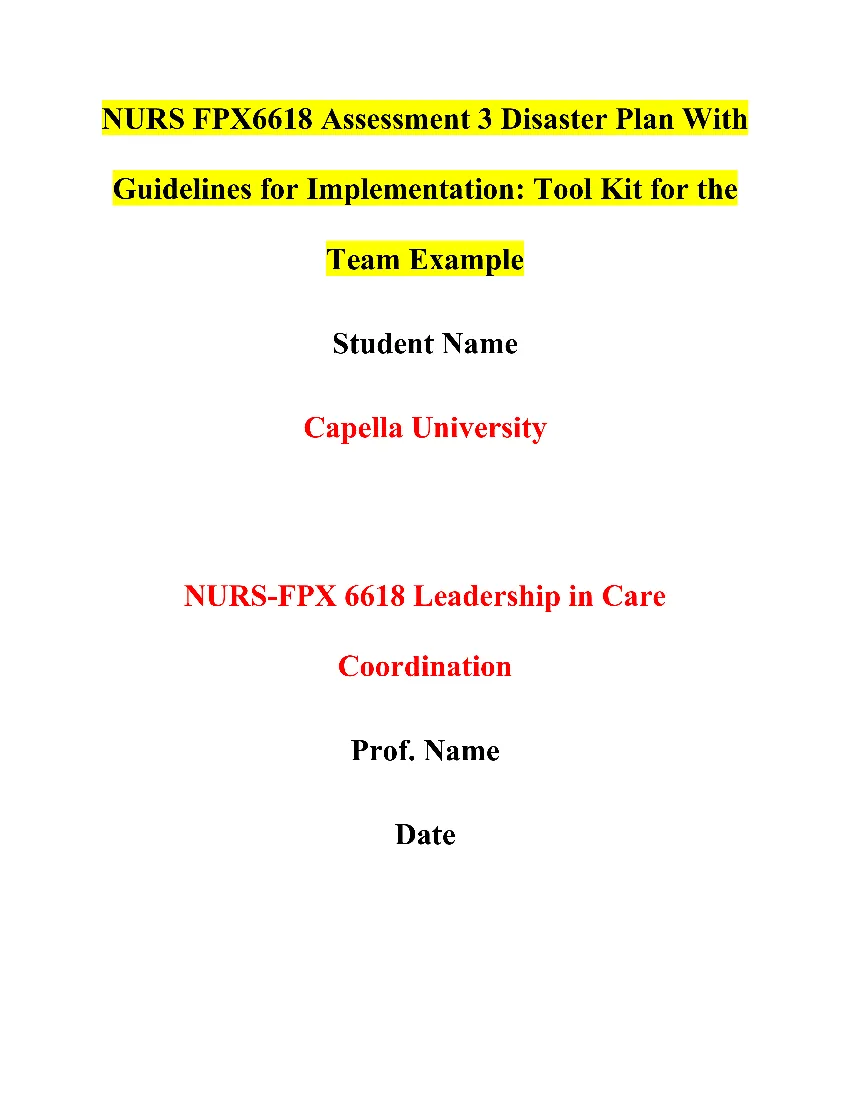 NURS FPX6618 Assessment 3 Disaster Plan With Guidelines for Implementation: Tool Kit for the Team
NURS FPX6618 Assessment 3 Disaster Plan With Guidelines for Implementation: Tool Kit for the Team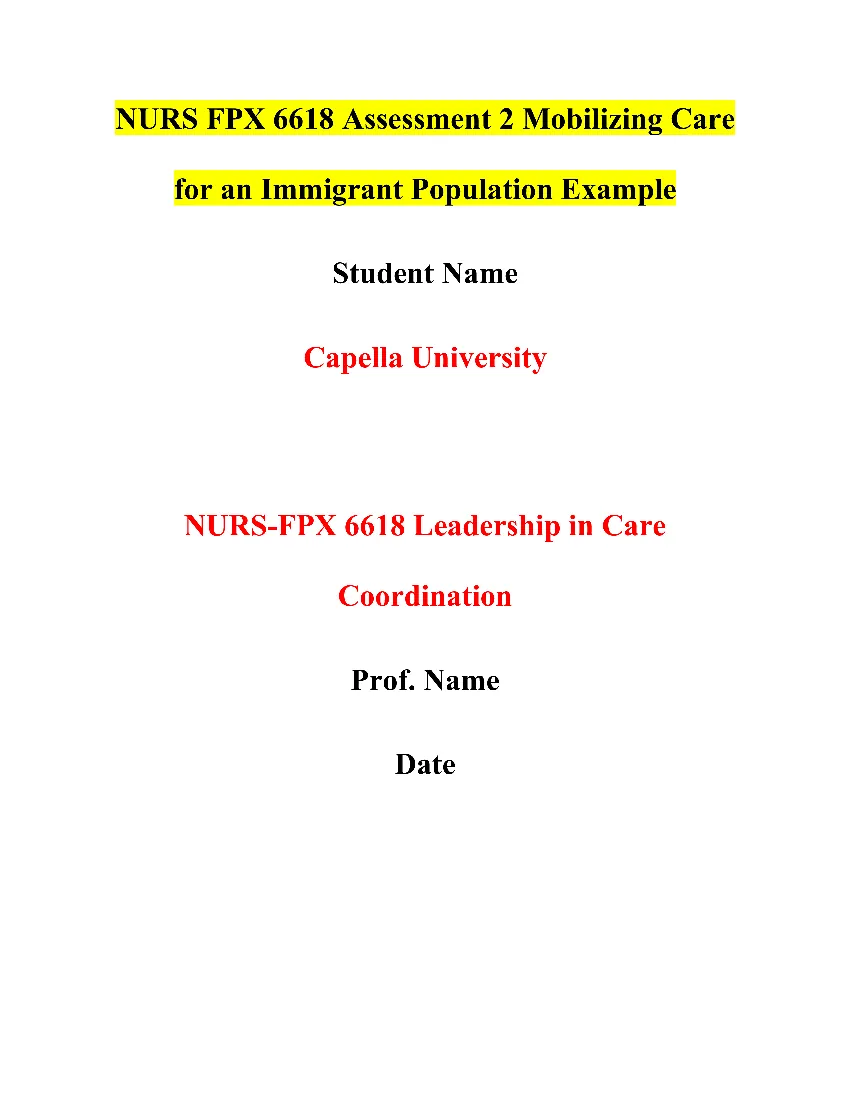 NURS FPX 6618 Assessment 2 Mobilizing Care for an Immigrant Population
NURS FPX 6618 Assessment 2 Mobilizing Care for an Immigrant Population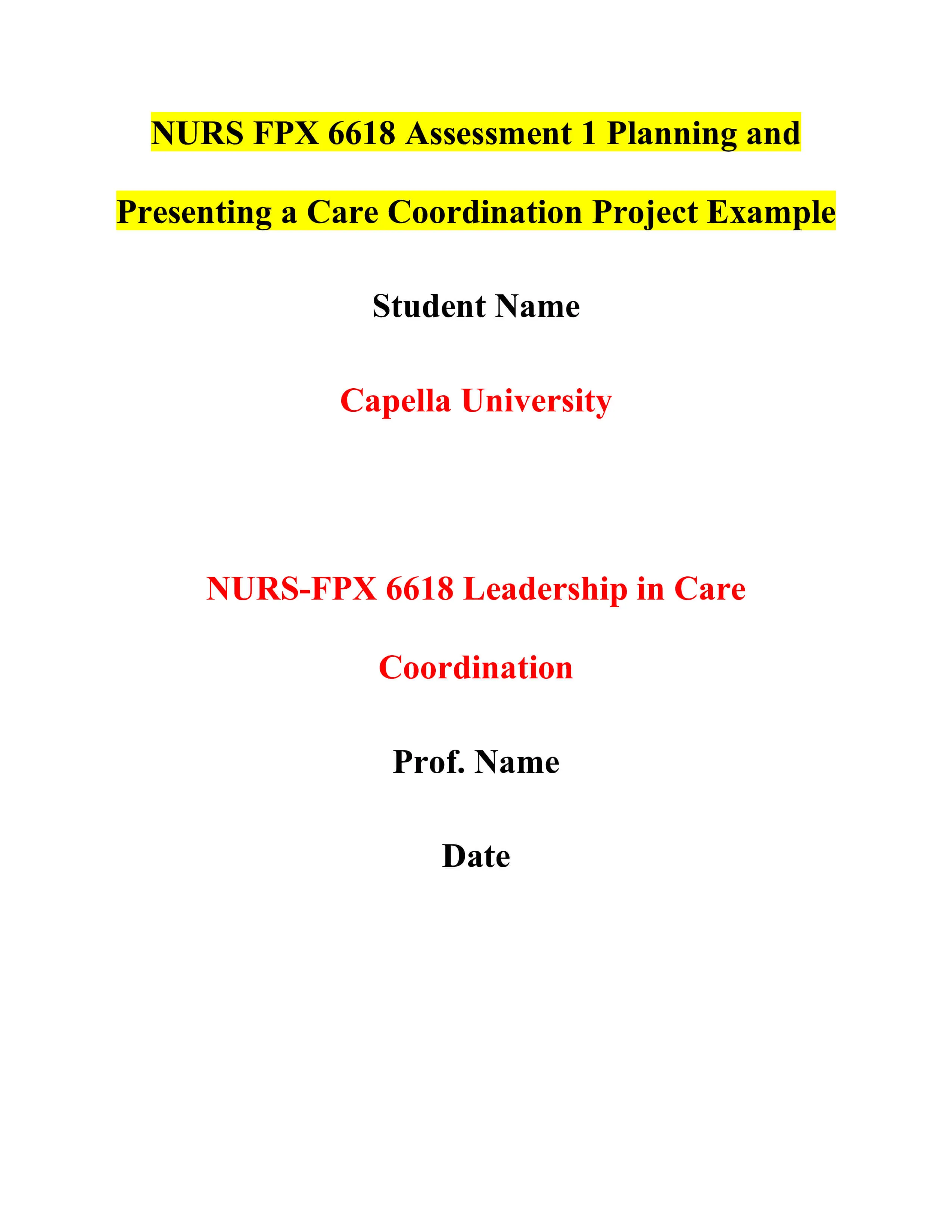 NURS FPX 6618 Assessment 1 Planning and Presenting a Care Coordination Project
NURS FPX 6618 Assessment 1 Planning and Presenting a Care Coordination Project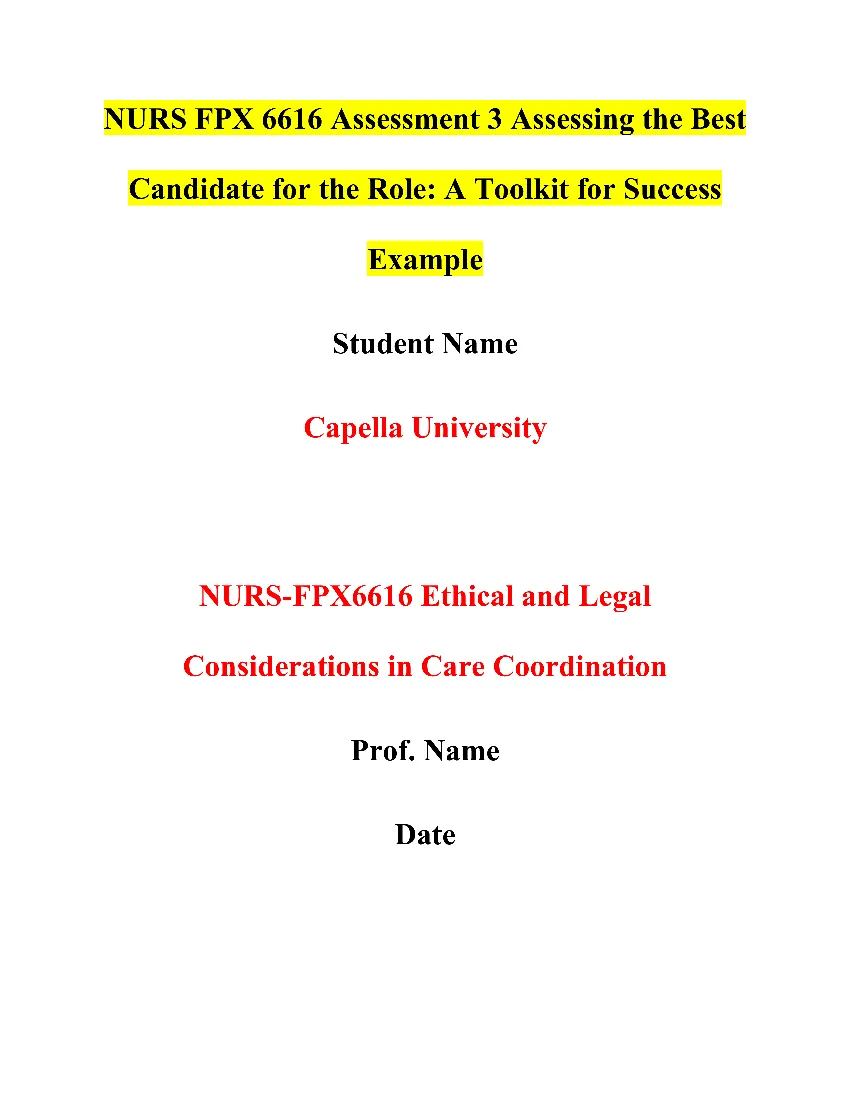 NURS FPX 6616 Assessment 3 Assessing the Best Candidate for the Role: A Toolkit for Success
NURS FPX 6616 Assessment 3 Assessing the Best Candidate for the Role: A Toolkit for Success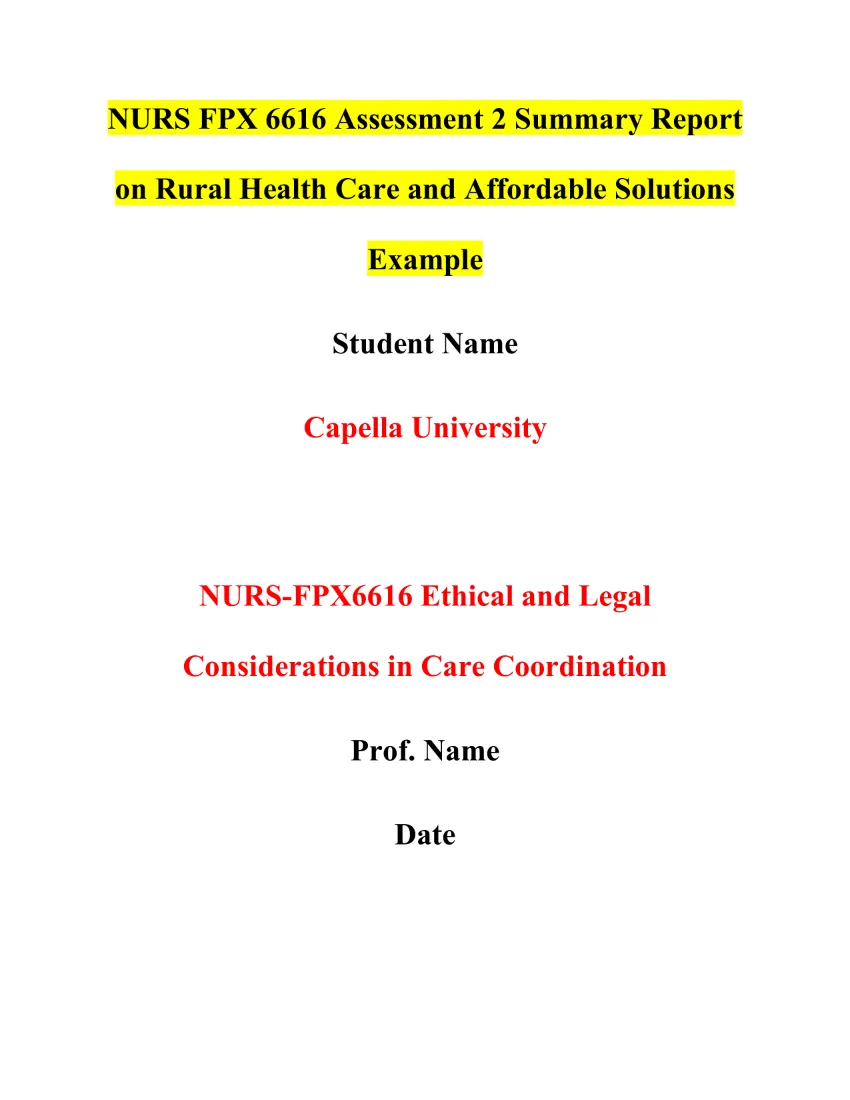 NURS FPX 6616 Assessment 2 Summary Report on Rural Health Care and Affordable Solutions
NURS FPX 6616 Assessment 2 Summary Report on Rural Health Care and Affordable Solutions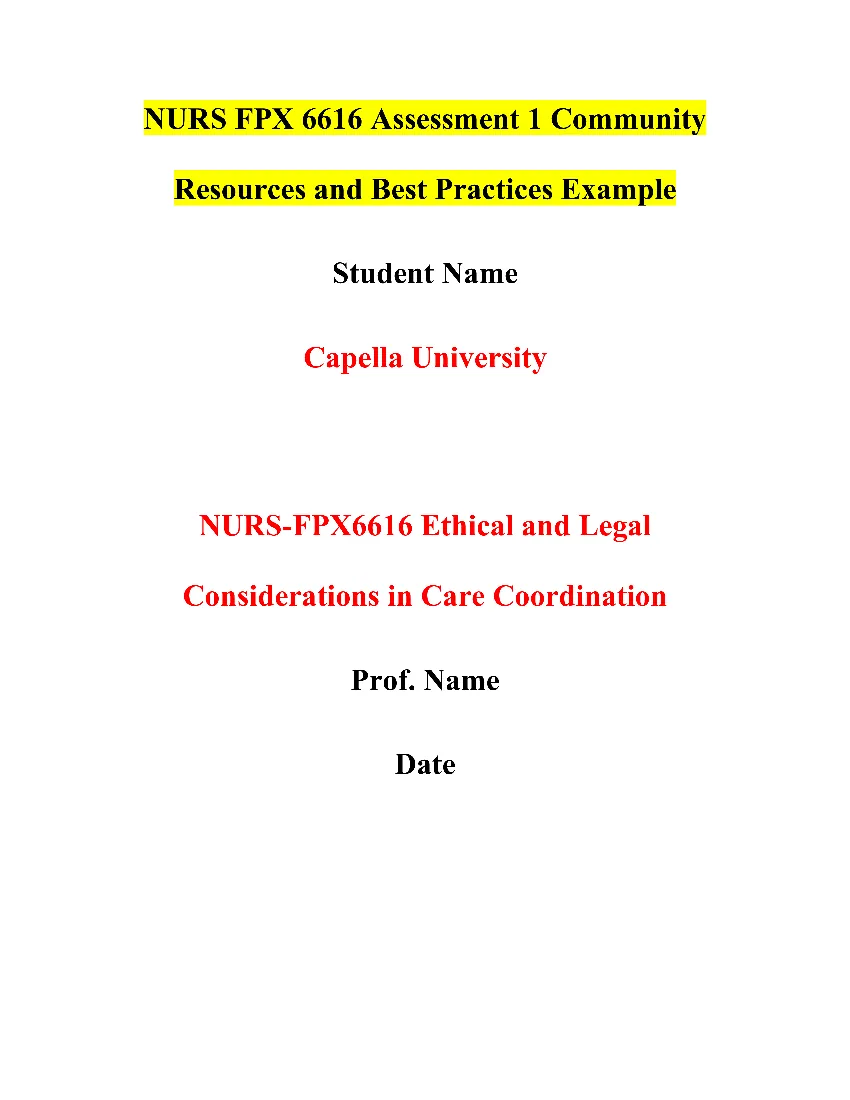 NURS FPX 6616 Assessment 1 Community Resources and Best Practices
NURS FPX 6616 Assessment 1 Community Resources and Best Practices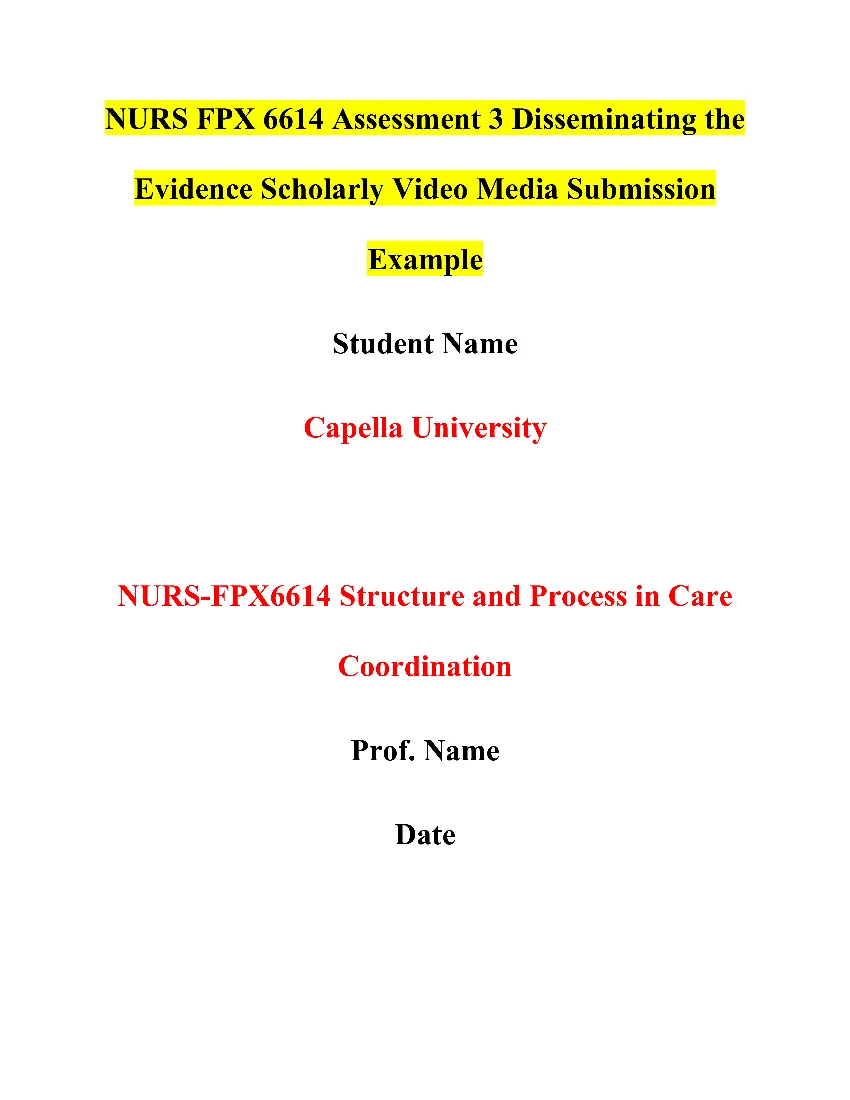 NURS FPX 6614 Assessment 3 Disseminating the Evidence Scholarly Video Media Submission
NURS FPX 6614 Assessment 3 Disseminating the Evidence Scholarly Video Media Submission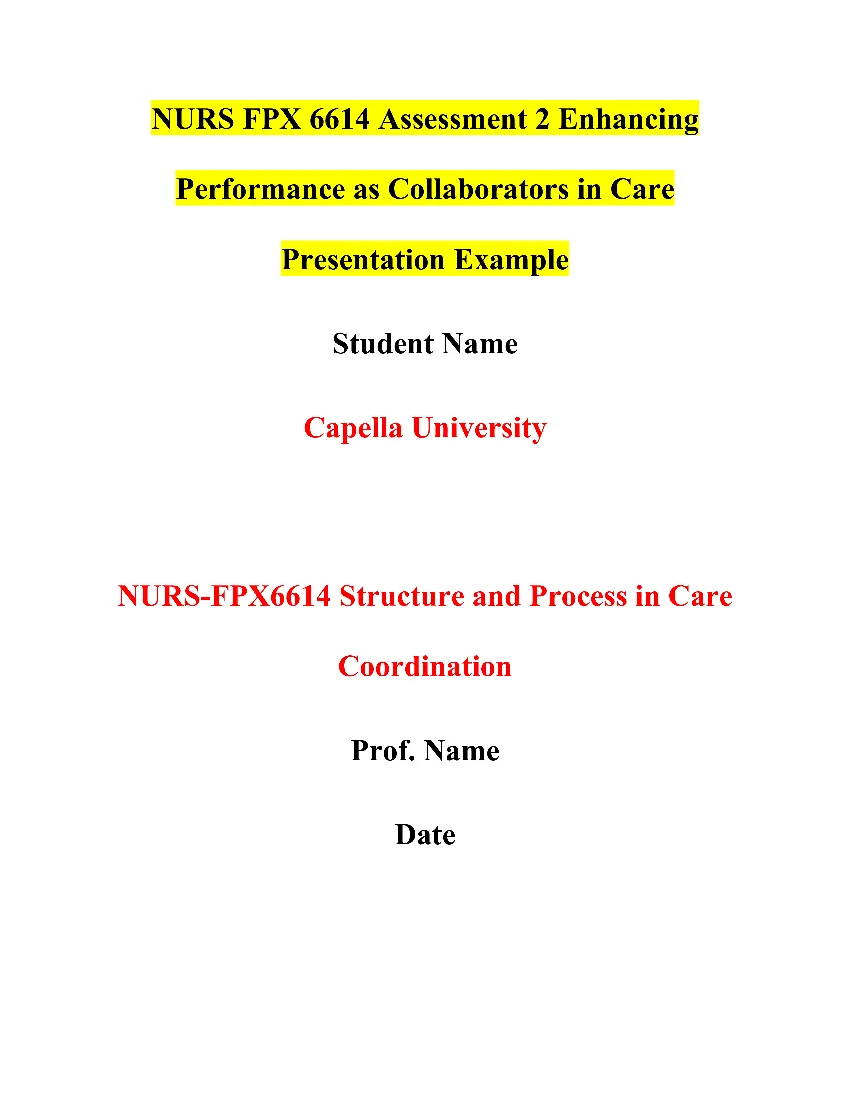 NURS FPX 6614 Assessment 2 Enhancing Performance as Collaborators in Care Presentation
NURS FPX 6614 Assessment 2 Enhancing Performance as Collaborators in Care Presentation